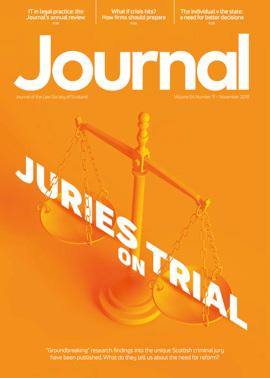Confronting hate crime - now and in the future
The Law Society of Scotland was recently invited to provide a Scottish perspective, with a focus on sectarianism, at a seminar on “Confronting Hate Crime in the UK”.
The event was held by the Public Policy Exchange Team, which was considering how to develop strategies in order to promote a tolerant society.
Hate crime affects not only its victims, both mentally and physically, but also influences the behaviour of other members of the public by encouraging them to offend in similar ways. It’s a controversial issue across the UK, for criminal justice organisations and all those committed to achieving a fairer and more just society.
Events at an Irish unity march in Govan on 31 August 2019 demonstrated that sectarianism is a live and relevant issue. There was universal condemnation of the disruption from across the Scottish political spectrum, with former First Minister Lord McConnell describing it as “an issue that stains Scotland’s character”.
The eruption of these events provides a useful context in which to discuss, define and consider how to develop ways to resolve sectarianism. It also highlights the current Scottish problems and asks what the messages should be to address all forms of hate crimes, wherever and whenever they arise.
Defining sectarianism
Sectarian tensions and discord in Scotland are rooted in its historical, political, economic and religious background. They go beyond mere identification with any particular church, support for specific football teams or promotion of cultural events, symbols and songs. Their existence in Scotland is clear, from these disturbing events in August as well as the singing of sectarian songs during a football match. Such unacceptable behaviour has been criticised by a football manager as the fans living in “the dark ages”.
The first step must be to define sectarianism. The Independent Working Group on Defining Sectarianism in Scots law set up by the Scottish Government recommended that “fair labelling” to be applied to sectarianism. Clarity of the criminal law is a prerequisite, with criminal acts being named for what they are, whether anti-Catholic or anti-Protestant. Defining sectarianism would provide that desired clarity, but not necessarily require its development into a specific stand-alone crime.
Developing strategies
There is a valid argument that the existing Scottish criminal law could be adequate, given the references to racial and religious prejudice. There appear no obvious gaps. Prosecutorial decisions are of course taken by the Lord Advocate, and convictions arise when the behaviour is clearly offending. But are there activities that should be prosecuted when they go beyond what we, as the public, consider to be acceptable? How should we approach this conundrum?
The reaction to the August events has demonstrated the commitment of the Scottish Government in tackling sectarianism. Its Programme for Government announced the intention to bring forward a Hate Crime Bill in 2020, following the Independent Review of Hate crime undertaken by Lord Bracadale.
That bill will offer an opportunity to review and consolidate hate crime legislation and provide an overarching code in one place which would be available for all to consult. It could set out the boundaries of behaviour considered to be criminal and which would be prosecuted.
Some people may not perceive their own behaviour to be offensive, but, for example, as simply expressing their right to support a particular football team in their own terms. Offending behaviour has to be much more than that of passionate support; it requires hostility, abuse or violent discriminatory behaviour. Deterrence by effective legislation that results in a criminal conviction (and the potential effect on their employment) may do much to dissuade people from certain types of behaviour.
Legislation provides transparency. It emphasises that certain behaviour is unacceptable. But it cannot nor should it be the only approach. Education is crucial across all sections of society from cradle to grave. Early engagement with communities on how to address these issues seems well underway in the funding of a number of projects aimed at those in prison, schools and at work.
Going forward
We are not alone in looking at this serious issue which blights numerous communities across the UK. The Law Commission of England & Wales is due to report in 2021 following its review of “the adequacy and parity of protection offered by the law relating to hate crime”, and will make recommendations for its reform. What will be interesting will be to see if its conclusions echo those of Lord Bracadale’s report.
Different areas, whether in Scotland or elsewhere in the UK, can have their own specific problems with hate crime, with some types more prevalent than others. The lessons and experience in tackling one aspect, such as sectarianism, can be used to address another. Scotland is benefiting from the recognition that sectarianism still exists and that current efforts to address it must continue.
As the Hate Crime Bill is introduced, ascertaining the Scottish Government’s approach on the challenges of how to handle these issues will be very important. Rather than identifying groups and giving them preferential status, the aspiration of seeking to promote equality may yet provide the best approach. To achieve equality, sectarianism and how it should be considered within Scots criminal law needs to be clearly articulated.
What happens in Scotland may well be viewed by others to see if it is an approach to adopt in other parts of the UK or even further afield.






